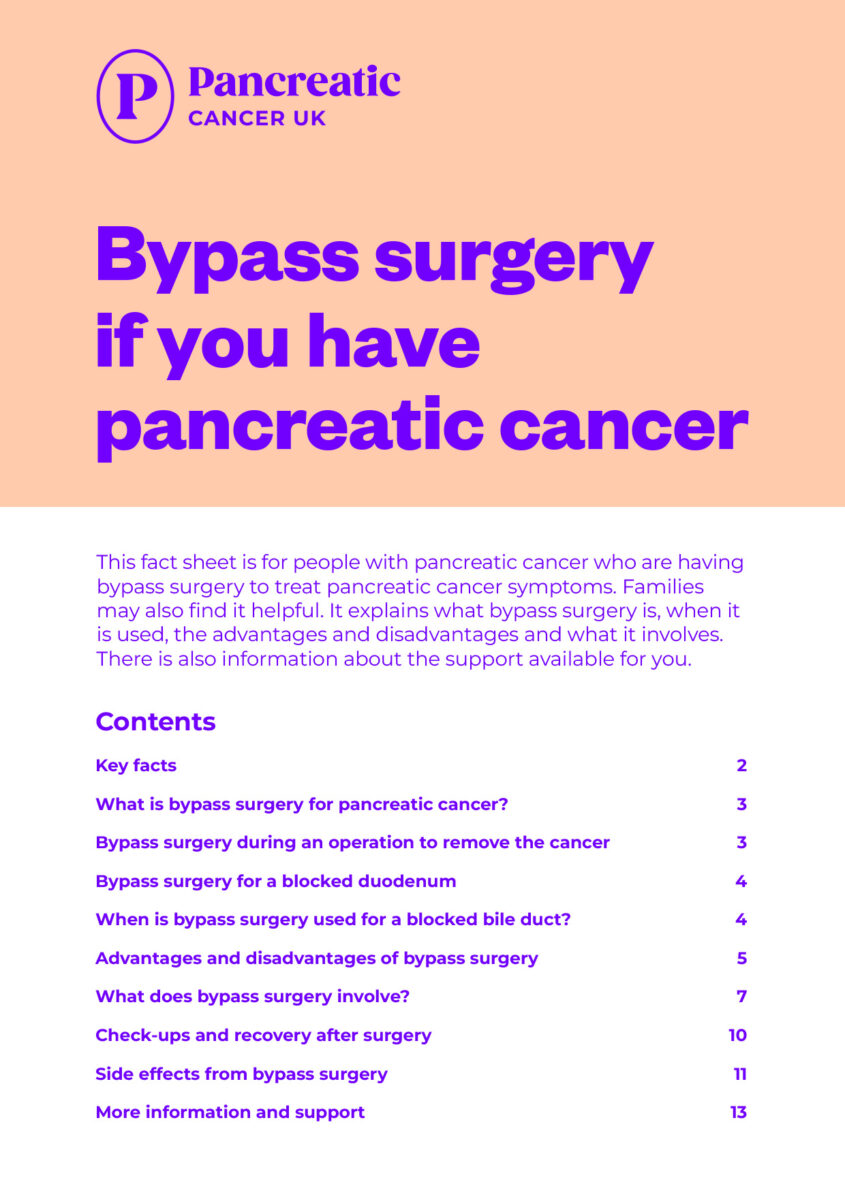If the cancer has blocked your duodenum or bile duct, bypass surgery gets around the blockage to treat your symptoms. It doesn’t remove the cancer. A different type of surgery is used to remove the cancer.
Whether bypass surgery is an option for you will depend on your symptoms, your diagnosis and how fit you are.
Bypass surgery during an operation to remove the cancer
Surgery to remove pancreatic cancer (such as the Whipple’s procedure) may be offered to some people. But sometimes after starting the operation, the surgeon may find that it’s not possible to remove the cancer. Bypass surgery may be done instead if the cancer has blocked your duodenum or bile duct, or to stop it blocking them in the future. This will not remove or treat the cancer, but it can help to manage symptoms.
If this is something that might happen, your surgeon will discuss it before your operation.
Bypass surgery for a blocked duodenum
After you eat, the food goes from your stomach into your duodenum. If the cancer has blocked the duodenum, food can’t pass out of the stomach. It builds up in your stomach and makes you feel and be sick. This is called gastric outlet obstruction.
Bypass surgery gets around the blockage, making a new way for food to pass out of the stomach into the duodenum. The operation is called a gastrojejunostomy.
You may have bypass surgery for a blocked duodenum if your cancer can’t be removed by surgery. Another option may be to have a tube called a stent put into the duodenum to open the blockage. Your doctor should consider bypass surgery rather than a duodenal stent if you are having longer term treatment.
When is bypass surgery used for a blocked bile duct?
Pancreatic cancer can cause jaundice by blocking the bile duct. The bile duct is the tube that takes bile from the liver to the duodenum.
If you have cancer that can’t be removed by surgery and your bile duct is blocked, you will usually have a stent put in to unblock it. But sometimes bypass surgery is used to make a new way for bile to flow. This is usually done if you were originally having surgery to remove the cancer but that was not possible. The operation is called a choledochojejunostomy or hepaticojejunostomy.
You may have bypass surgery for both a blocked duodenum and blocked bile duct at the same time. This is called a double bypass.
Advantages and disadvantages of bypass surgery
Bypass surgery is a big operation, so it’s important to talk about the advantages and disadvantages with your surgeon before you decide to have this surgery. Ask them any questions you have.
Advantages
- The surgery bypasses the blockage and should help your symptoms.
- It may be an option if a stent is not suitable for you.
- Bypass surgery avoids the problem of stents getting blocked.
- It is a longer lasting way to treat your symptoms than using stents.
Disadvantages
- You may have some side effects, but these can usually be managed.
- You will need to stay in hospital for several days after bypass surgery, and it may take a few months to fully recover.
- Bypass surgery is major surgery and there are possible
What are the possible risks?
As with all surgery, there are some possible risks.
- With bypass surgery for a blocked bile duct, there is a risk of bile leaking after the operation. This can cause swelling and pain in the tummy, and infection.
- There is a small risk with a duodenal bypass that the new join between the stomach and small intestine does not heal properly. This can cause leaking from the stomach that can lead to infection
- There is a risk of getting a chest infection. There is also a risk of blood clots in a vein in a leg (deep vein thrombosis, DVT) or lung (pulmonary embolism, PE).
- Your wound may get infected. You will be given antibiotics to reduce this risk.
- There is a small risk of bleeding during the operation, and you may need a blood transfusion to replace the blood lost. This is not common.
- There are risks to having a general anaesthetic, which are the medicines that put you to sleep during surgery. The anaesthetist will monitor you during the operation.
- As with any surgery, there is a small risk of dying.



